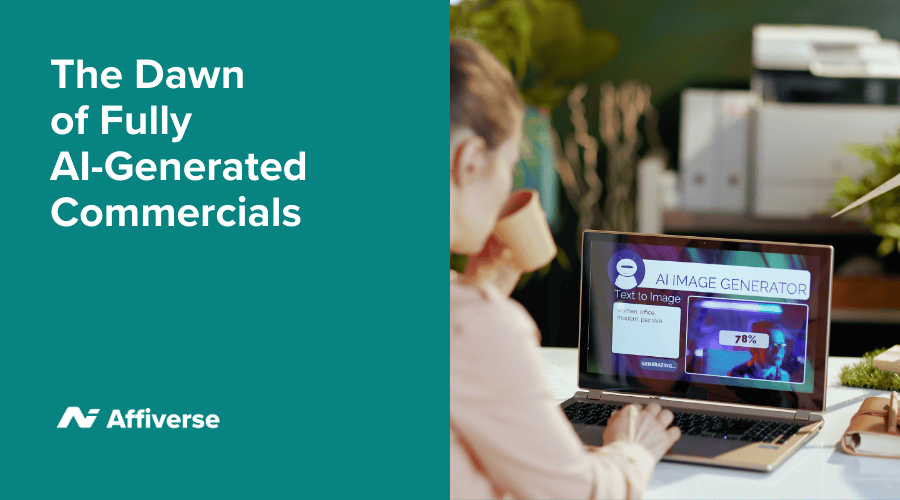The Dawn of Fully AI-Generated Commercials

The advertising world is on the verge of a revolution, with artificial intelligence (AI) poised to redefine how campaigns are created, delivered, and optimised. Industry leaders are predicting that 2025 could be the year we see fully AI-generated commercials become mainstream – an innovation that promises to be faster, more cost-effective, and highly personalised.
For marketers, this shift represents both an exciting opportunity and a new set of challenges. As AI becomes an integral part of the creative process, the role of human creativity is being redefined, and the potential of advertising is expanding in ways previously unimaginable.
AI’s Role in Commercial Creation
AI is already a key player in the advertising process, from automating repetitive tasks to optimising campaign targeting. However, its capabilities are rapidly evolving, and the creation of entire commercials using AI is no longer just a concept.
AI can now generate scripts, visuals, and even voiceovers, producing polished content that feels indistinguishable from human-made work. Tools like generative AI models are capable of analysing brand guidelines, audience data, and trending content to produce ads tailored for specific demographics.
This approach saves time and money, particularly for smaller brands that may not have the budget for traditional production. It also allows for rapid iteration, with AI tweaking content based on performance data to ensure campaigns stay relevant.
Personalisation at Scale
One of the most promising aspects of AI in advertising is its ability to create personalised content on a massive scale. AI can generate hundreds, or even thousands, of ad variations tailored to individual preferences, interests, and behaviours.
For instance, an AI-generated video ad for a fitness product could show different messaging, imagery, and tone depending on whether the viewer is a seasoned athlete or a beginner looking to get in shape. This level of personalisation makes ads more engaging and increases the likelihood of conversions.
For marketers, this means moving beyond one-size-fits-all campaigns to deliver content that resonates with each segment of their audience.
Efficiency and Cost Savings
Producing commercials has traditionally been a time-consuming and expensive process, involving scriptwriters, directors, production crews, and post-production teams. AI is changing that by automating many of these steps.
An AI-driven production can generate high-quality content in hours, significantly reducing costs and timelines. This is particularly advantageous for digital-first campaigns, where brands need to produce a constant stream of content to stay relevant.
Moreover, AI can analyse campaign performance in real time, identifying what works and what doesn’t. This feedback loop enables brands to adjust their messaging on the fly, maximising their return on investment.
The Challenges of AI-Generated Ads
While the potential of AI in advertising is immense, it’s not without challenges.
- Authenticity: One of the biggest concerns is maintaining authenticity. Ads created entirely by AI run the risk of feeling overly polished or impersonal, which could alienate consumers. Brands will need to strike a balance between efficiency and maintaining a human touch.
- Creative Control: AI can generate content, but it still requires human oversight to ensure the messaging aligns with brand values and objectives. This collaboration between human and machine is crucial to achieving meaningful results.
- Ethical Concerns: The use of AI in advertising raises ethical questions, particularly around data privacy and transparency. Consumers need to trust that their data is being used responsibly, and brands must be clear about how AI-generated content is created.
- Initial Costs: While AI can save money in the long run, the initial investment in AI tools and training can be significant, particularly for smaller companies.
What This Means for the Advertising Industry
The rise of fully AI-generated commercials is set to reshape the advertising industry. For brands, it offers a chance to innovate and connect with audiences in new ways. For marketers, it requires a shift in mindset, embracing AI as a creative partner rather than a replacement for human ingenuity.
As AI tools become more sophisticated, the possibilities for advertising are limitless. From creating hyper-personalised content to producing campaigns at unprecedented speed, AI is unlocking opportunities that were previously out of reach.
However, the human element remains critical. Creativity, emotional resonance, and cultural awareness are qualities that machines have yet to master. The most successful campaigns will likely be those that blend AI’s capabilities with human insight, creating ads that are not only efficient but also meaningful.
Looking Ahead
The advertising world is entering a new era, where AI will play a central role in shaping how brands communicate. Fully AI-generated commercials are no longer a distant possibility—they’re just around the corner.
For those willing to embrace this change, the rewards are clear: faster production, lower costs, and a level of personalisation that was once unimaginable. But with these opportunities come new responsibilities, as brands navigate the ethical and creative challenges of this technology-driven future.
AI isn’t just a tool, it’s becoming a co-creator. The challenge for marketers is to harness its power while keeping their campaigns authentic, engaging, and human at heart.






